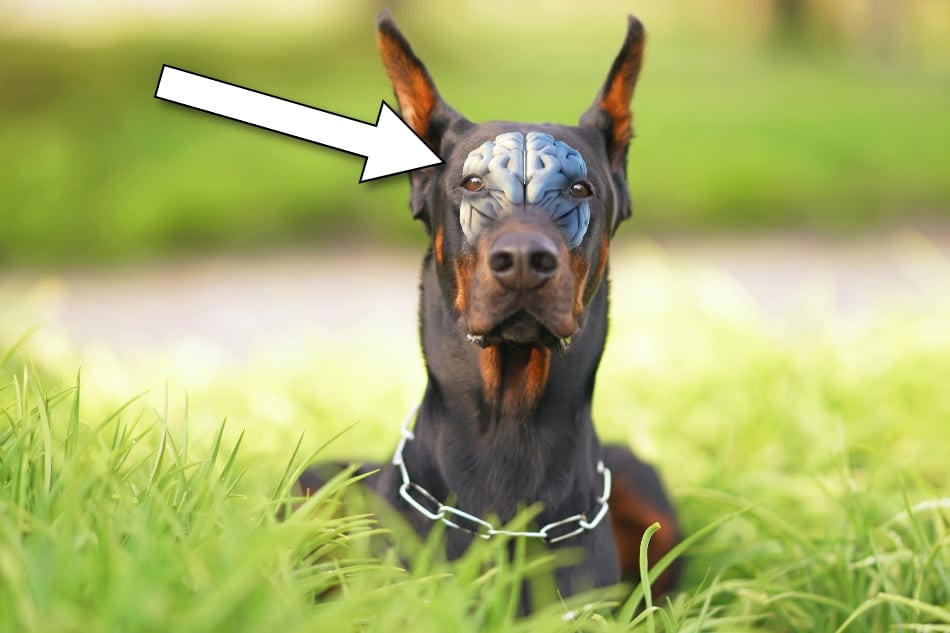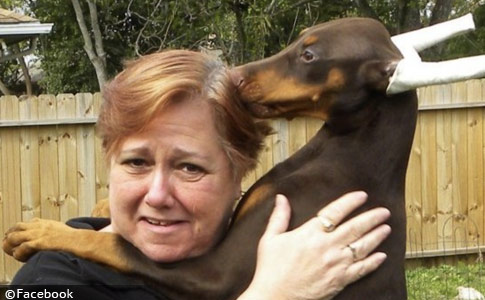When it comes to the question of whether or not Dobermans bite their owners, there is a common misconception that they are inherently aggressive and dangerous. However, this is far from the truth. In fact, according to a study conducted by the American Veterinary Medical Association, Dobermans are not more likely to bite their owners than other dog breeds. This surprising fact challenges the stereotype surrounding Dobermans and highlights the importance of understanding a breed’s temperament and individual training.
To better understand Dobermans and their behavior towards their owners, it is essential to consider their history and background. Originally bred in Germany by a man named Louis Dobermann in the late 19th century, Dobermans were initially trained to be guard dogs. They possess qualities such as loyalty, intelligence, and protectiveness, which can be misinterpreted as aggressiveness. However, with proper socialization, training, and responsible ownership, Dobermans can develop into loving and well-behaved companions. It is crucial for owners to provide an environment that promotes positive reinforcement and encourages a strong bond between them and their Doberman, preventing any potential aggression.
Doberman Pinschers are generally loyal and affectionate dogs. However, like any breed, there is a potential for aggression. Proper socialization, training, and handling are crucial in preventing any aggression issues. It’s important for owners to establish themselves as the pack leader and provide consistent boundaries. With responsible ownership and training, the likelihood of a Doberman biting their owner is significantly reduced.

Do Dobermans Bite Their Owners?
The topic of whether Dobermans bite their owners is one that many people are curious about. The Doberman Pinscher is a breed known for its loyalty, intelligence, and protective nature. However, like any dog, there are factors that can influence a dog’s behavior, including their temperament, training, and socialization. In this article, we will explore the question of whether Dobermans bite their owners and delve into the various factors that can contribute to a dog’s behavior.
Temperament of Dobermans
Dobermans are known for their protective nature and loyalty to their family. They are often described as energetic, intelligent, and alert. While they have a strong guarding instinct, they are not typically aggressive towards their owners. However, it is important to remember that individual temperament can vary among dogs of any breed.
Early socialization and training play a crucial role in shaping a Doberman’s temperament. When a Doberman is properly socialized from a young age, they are more likely to develop into well-rounded and well-behaved adults. Exposing them to different people, animals, and environments helps them learn how to appropriately respond to various situations, reducing the likelihood of aggression.
While Dobermans are generally not prone to biting their owners, it is essential to remember that any dog has the potential to bite if they perceive a threat or feel scared or threatened. Responsible ownership, proper training, and understanding canine body language are key in preventing biting incidents.
Training and Socialization
Training and socialization are fundamental in raising a well-behaved and non-aggressive Doberman. Basic obedience training, such as sit, stay, and recall, helps establish a strong foundation of communication between the owner and the dog. Training also assists in teaching appropriate behavior and enables the owner to control and redirect the dog’s actions.
Proper socialization is equally important. Introducing a Doberman to different people, animals, and environments at an early age helps them become comfortable and confident in various situations. By exposing them to different stimuli, they are less likely to react aggressively when faced with unfamiliar circumstances.
It is crucial to note that socialization and training should continue throughout a Doberman’s life. Consistency, positive reinforcement, and ongoing education are vital in maintaining a well-balanced and non-aggressive dog. Regular interaction with other dogs, people, and providing mental and physical stimulation are essential for their overall well-being.
Factors Influencing Behavior
Several factors can influence a Doberman’s behavior, which in turn may impact their likelihood of biting their owners. These factors include:
- Health issues: A Doberman in pain or discomfort may exhibit aggression as a response. Regular veterinary care and prompt addressing of any health concerns are important.
- Fear and anxiety: Like humans, dogs experience fear and anxiety, which can lead to aggressive behavior. It is vital to identify and address the root cause of the fear or anxiety to prevent biting incidents.
- Poor socialization: Insufficient socialization during a Doberman’s formative months can lead to fear, anxiety, and potential aggression. Introducing them to different experiences and stimuli helps build their confidence and reduces the likelihood of biting.
- Past trauma or negative experiences: Dogs that have had traumatic or negative experiences in the past may be more prone to aggressive behavior. These dogs may require additional patience, understanding, and professional help to overcome their fears and build trust.
- Protective instincts: Dobermans have a natural protective instinct, and while it is one of their desirable traits, it can also lead to potential biting if not managed properly. It is crucial to balance their instinct to protect with appropriate socialization and training to prevent any aggressive behavior.
Preventing Biting Incidents
To prevent biting incidents in Dobermans or any other dog breed, here are some essential tips:
- Start training and socialization from a young age.
- Use positive reinforcement methods, such as treats and praise, to reward good behavior.
- Provide regular exercise and mental stimulation to keep your Doberman physically and mentally healthy.
- Learn to understand your dog’s body language and signs of stress or discomfort.
- Teach children and other family members how to interact with the dog appropriately and supervise their interactions.
- Seek professional help from a certified dog trainer or behaviorist if you encounter any aggression or concerning behavior.
Conclusion
Do Dobermans bite their owners? While there is always a potential for any dog, including Dobermans, to bite, they are not known for being aggressive towards their owners. The temperament, training, socialization, and individual history of each dog play a significant role in their behavior. Proper training, socialization, and responsible ownership are crucial in preventing biting incidents and fostering a strong bond between the owner and their Doberman.
Key Takeaways: Do Dobermans Bite Their Owners?
- Dobermans are generally loyal and protective dogs.
- Proper socialization and training can help prevent aggressive behavior towards owners.
- Negative experiences, fear, or pain can trigger defensive biting in any dog breed, including Dobermans.
- Early puppy training and ongoing obedience training are crucial for preventing biting incidents.
- Owning a Doberman requires responsible ownership and meeting their physical and mental exercise needs.
Frequently Asked Questions
Here are some commonly asked questions about Dobermans and their tendency to bite their owners:
1. Are Dobermans prone to biting their owners?
While all dogs have the potential to bite, Dobermans are not inherently prone to biting their owners. Like any other breed, a dog’s behavior is largely influenced by its upbringing, socialization, and training. When properly trained and socialized from a young age, Dobermans can be well-behaved and friendly companions. It is essential to provide them with proper training, positive reinforcement, and a loving environment to prevent any aggressive behavior.
However, it is important to note that certain factors, such as neglect, abuse, or a lack of socialization, can contribute to aggressive behavior in any dog breed, including Dobermans. Responsible ownership, early socialization, and proper training are crucial to ensure a healthy and well-behaved Doberman.
2. What can cause aggression in Dobermans?
Aggression in Dobermans, or any dog, can be caused by various factors. Some common causes of aggression in Dobermans include:
– Lack of socialization during puppyhood
– Fear or anxiety due to traumatic experiences
– Poor training and lack of discipline
– Medical conditions or pain
If a Doberman displays aggressive behavior, it is important to consult with a professional dog trainer or behaviorist to assess the underlying cause and develop an appropriate training and behavior modification plan.
3. How can I prevent my Doberman from biting?
Preventing your Doberman from biting involves several key strategies:
– Socialize your Doberman from a young age by exposing them to different people, animals, and environments in a positive and controlled manner.
– Provide consistent and positive training using reward-based methods. Enroll in obedience classes or work with a professional dog trainer to teach your Doberman good manners and appropriate behavior.
– Establish clear rules and boundaries for your Doberman and consistently enforce them. Use positive reinforcement techniques to reward good behavior.
– Avoid harsh punishment or physical corrections, as this can lead to fear and defensive aggression.
– Regularly exercise your Doberman to ensure they have an outlet for their energy and mental stimulation.
4. Can a Doberman be trained to be gentle with their owners?
Yes, Dobermans can be trained to be gentle with their owners. Training plays a crucial role in shaping a dog’s behavior and temperament. Obedience training, socialization, and positive reinforcement techniques can help teach a Doberman to be gentle, obedient, and well-mannered with their owners.
Consistency, patience, and positive reinforcement are key when training a Doberman to be gentle. Rewarding calm and gentle behavior, and redirecting any unwanted behaviors, can help reinforce the desired behavior. It is important to start training early and be consistent with the training methods to achieve the best results.
5. What should I do if my Doberman displays aggressive behavior towards me?
If your Doberman displays aggressive behavior towards you, it is crucial to take immediate action to address the issue. Here are some steps to follow:
– Consult with a professional dog trainer or behaviorist to assess the underlying cause of the aggression and develop a behavior modification plan.
– Ensure your safety by avoiding situations that trigger the aggression and creating a safe environment for both you and your dog.
– Implement training techniques recommended by the professional, focusing on positive reinforcement and redirecting aggressive behaviors.
– Never resort to punishment or physical force, as this can escalate the aggression and cause further harm.
Addressing aggressive behavior in a Doberman requires professional guidance and patience. With the right approach and consistent training, it is possible to modify their behavior and create a safer and harmonious relationship between you and your Doberman.

Why Do Dobermans Turn on Their Owners?
In summary, it is important to note that Doberman Pinschers have the potential to bite their owners, just like any other dog breed. However, with proper training, socialization, and responsible ownership, the likelihood of a Doberman biting their owner can be greatly reduced.
It is crucial to establish a strong bond with your Doberman and provide them with consistent discipline and positive reinforcement. Early and ongoing socialization is also essential to teach them appropriate behavior around people and other animals. By following these guidelines and being a responsible owner, the risk of a Doberman biting their owner can be minimized.
